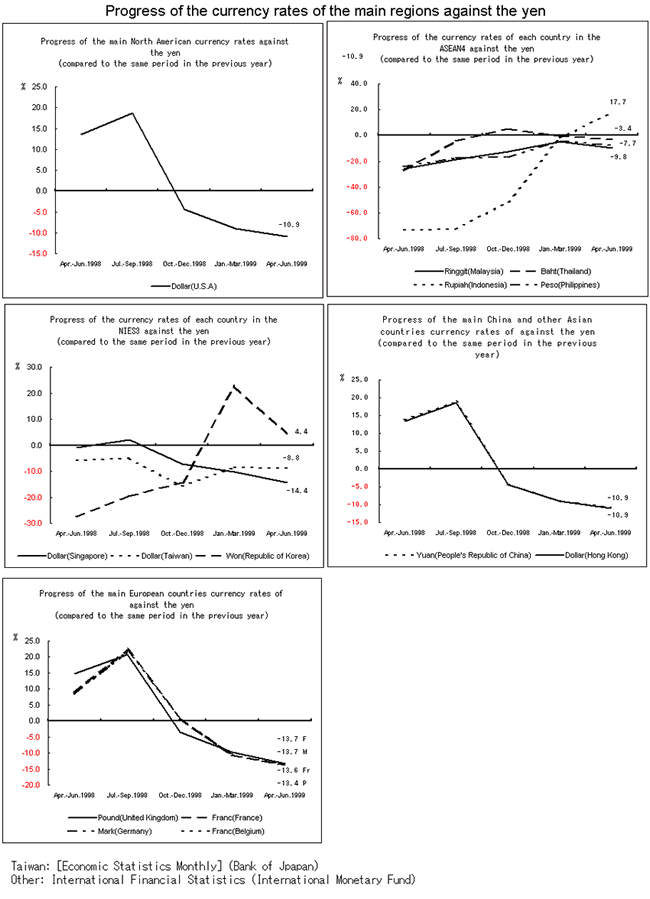

- Statistics

- Quarterly Survey of Overseas Subsidiaries

- Quarterly Survey of Japanese Business Activities (April-June 1999)

- Characteristics of the Current Period as Reflected in the Behavior of Overseas Subsidiaries
Quarterly Survey of Overseas Subsidiaries
Characteristics of the Current Period as Reflected in the Behavior of Overseas Subsidiaries
(Period from April-June 1999)
19 October, 1999
Enterprise Statistics Department,
Research and Statistics Division,
Ministry of International Trade and Industry
The sales DI of the overseas subsidiaries of Japanese companies (forecast for the July - December period) improved in almost all the regions compared with the previous period. Particularly in three regions in Asia, improvement was seen for the third consecutive period.
The degree of decline of the sales of the overseas subsidiaries (in yen terms) compared with the same period a year earlier narrowed particularly in Asia, where the local sales by the overseas subsidiaries improved substantially year-on-year, switching to positive growth for the first time since the start of the survey.
- The quarter-to-quarter comparison of the sales DI of the overseas subsidiaries (Note 1) improved for the third consecutive period by 5.4 percent (from 28.8% to 34.2%).
- By region, the period-to-period comparison of the sales DI of the overseas subsidiaries improved in all the regions other than North America, particularly in the ASEAN4 countries (from 28.9% to 42.9%). In the NIES3 countries where the DI level remained negative from the latter half of fiscal 1998 to the first half of fiscal 1999, prospects are good as evidenced by the recent swing of the DI level back to positive growth for the second consecutive period.
- It was noteworthy that the sales DI of the domestic parent companies registered a significant improvement of 26.5 percent compared with the same period a year earlier (-13.1% to 13.4%).
- Sales of the overseas subsidiaries (in yen terms) declined for the third consecutive period by 4.8 percent compared with the same quarter a year earlier, but the degree of decline narrowed significantly in Asia by 8.3 percent (from -11.2% to -2.9%) compared with the previous quarter, indicating a reduction in the degree of decline. One of the reasons why the sales continued to decline was the strong yen against many of the local currencies such as the U.S. dollar, European currencies, etc. (Note 2).
- In Asia where a substantial reduction was seen in the degree of decline in sales (in yen terms), improvement in local sales was particularly remarkable, with increases seen in the ASEAN4 countries (an increase of 7.3% compared with the same quarter a year earlier), and China/other Asian regions (1.7%), while the decline that had been recorded in the NIES3 countries fell substantially compared with the previous quarter (from -23.2% to -6.4%). As a result, Asia as a whole registered a year-on-year increase for the first time since the start of the survey (0.3%).
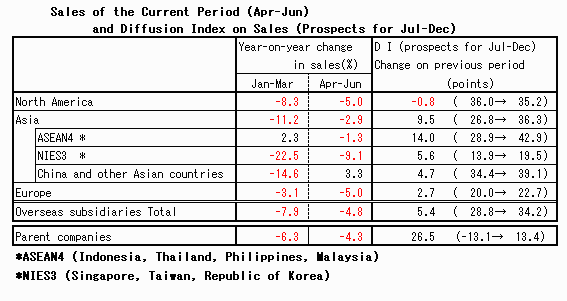
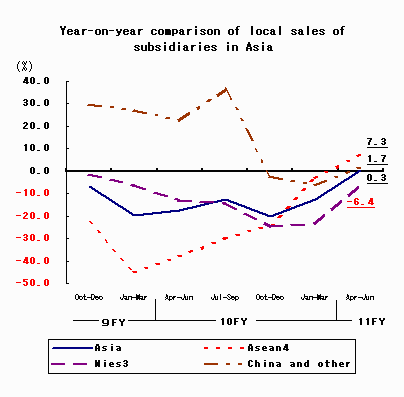
- Employment by the overseas subsidiaries improved in all the regions, posting a year-on-year increase of 3.1 percent for the first time in five periods. Particularly significant was the improvement in the ASEAN4 countries (from -1.0% to 6.8%), the NIES3 countries (from -11.6% to -6.3%) and Europe (from -0.1% to 8.7%).
- On the other hand, employment by the domestic parent companies continued to decline, showing a 3.1 percent reduction in this quarter compared with the same quarter a year earlier, the greatest decline since the start of the survey and exceeding the earlier peak (a 2.2% reduction) recorded in the previous period.
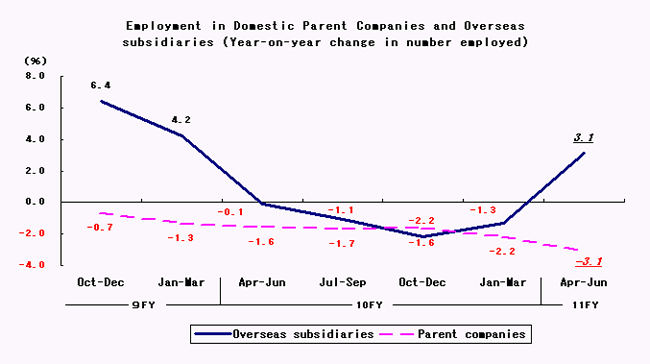
- The period-to-period comparison of DI (forecast for the July - December period) indicated a further decline of 6.2 percent with the domestic parent companies (from -28.3% to -34.5%) centered around the transportation machinery industry, whereas that with the overseas subsidiaries registered an improvement for the third consecutive period of 4.0 percent (from 1.6% to 5.6%).
- The quarter-to-quarter comparison of DI of the overseas subsidiaries by region showed that Europe fell by 0.1 percent (from -0.9% to -1.0%), but North America and Asia improved by 8.1 percent (from 0.0% to 8.1%) and 4.6 percent (from 2.3% to 6.9%) respectively. In particular, all regions in Asia registered an improvement, 5.0 percent (from 7.1% to 12.1%) in ASEAN4 countries, 4.3 percent (from -11.2% to -6.9%) in the NIES3 countries and 2.7 percent (from 6.9% to 9.6%) in China/other Asian regions.
- Whereas the intracompany trade between the domestic parent companies and their overseas subsidiaries declined in both exports to the overseas subsidiaries (a decline of 6.1% compared with the same quarter a year earlier) and imports from the overseas subsidiaries (a decline of 8.7% similarly), their ratio in the total exports and imports of the domestic parent companies increased, registering a growth of 1.7 percent compared with the same quarter a year earlier (from 45.8% to 47.5%).
- Exports by the overseas subsidiaries to Japan (so-called "reimports") continued to decline by as much as 9.4 percent.
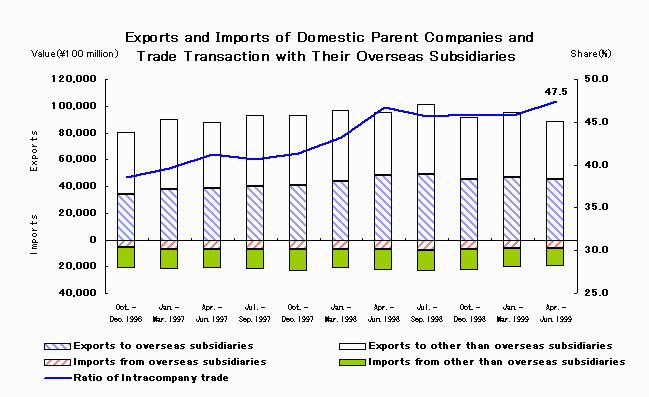
- Note 1 DI = Percentage of the companies expecting increase - Percentage of the companies
- expecting decrease
- Comparison of DI with the previous period = The current DI - The previous DI
- Note 2 "Trend of Major Currencies against the Yen" on page5 for changes in the yen-foreign currencies exchange rates.
